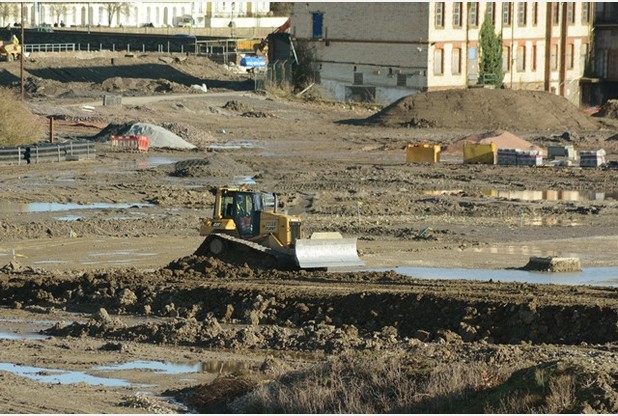Workers “downed tools” at a major housing development after five lorryloads of soil possibly contaminated with asbestos were dumped on the site.
Workers “downed tools” at a major housing development after five lorryloads of soil possibly contaminated with asbestos were dumped on the site.
The incident happened last Wednesday, (may 4) and is the latest twist in a long-running saga.
The soil with its potentially deadly cargo was trucked from the former Fremington Army Camp in North Devon to a new development, Anchorwood Bank, in Barnstaple.
And, in an email, the chief executive of North Devon District Council suggested that the potentially contaminated soil came from “a stockpile” at the Bovis/Barratt Homes development at Fremington Army Camp, where a number of families have already moved into their new houses.
Environmental campaigner Joanne Bell claimed the lorries were driven uncovered through the town.
Mrs Bell is also fighting against plans to build on the old Yelland Power Station site on the banks of the Taw/Torridge estuary, where some 700 tonnes of asbestos are known to be buried.
In Barnstaple, North Devon Homes is building 172 homes, plus shops on the old Shapland and Petter furniture company site.
A spokeswoman for the company said: “The contractor at Anchorwood Bank is importing material for use on site from several locations including Fremington Army Camp.
“The contractor’s works at Anchorwood Bank are completed in accordance with a very robust materials management plan. All soil that is imported to the site is inspected.
“Following reports received last week, the importation of soil from Fremington Army Camp has been suspended with immediate effect. The imported soil stockpile at Anchorwood Bank has been quarantined and further tests and analysis are being conducted as a precautionary measure.
“We are confident that our contractor’s procedures and response to this concern have been timely and efficient.”

Fremington Army Camp in 1947.
She did not say whether the load had been carried uncovered.
In an email last Thursday, sent on his behalf, North Devon chief executive Mike Mansell said the council had received several reports and specific allegations about the presence of asbestos on the Fremington site.
“We remain satisfied that contaminated material on the site continues to be dealt with appropriately by the developer, and that as a result there would appear to be no immediate risk to public health.”
He went on: “Yesterday [last Wednesday] the council received claims that contaminated material was being taken from the Fremington Army Camp site for use on the Anchorwood Bank development in an unsheeted lorry.”
He said the council was investigating, but added: “As part of a routine visual inspection of the imported material, the contractor currently undertaking the works at Anchorwood Bank identified the possibility of asbestos being present in the material. They immediately ceased the import and sent the five un-tipped loads back to Fremington.
“It is suspected the driver mistakenly took material from the wrong stockpile at Fremington.”
He said the contractor had subsequently quarantined the stockpile area at Anchorwood and taken samples there and at Fremington to be tested.

The Anchorwood site in Barnstaple.
Barratt Homes and Bovis Homes said in a joint statement: “Throughout our involvement in the development at Fremington we have been going above and beyond what is required in the normal remediation of a site such as this.
“We have worked closely with North Devon District Council and the Health and Safety Executive to ensure that a robust approach is taken and they have supported our rigorous screening programme.
“If the screening programme detects small traces of asbestos then the appropriate measures are taken and it is managed by specialists in line with a specific remediation method statement, which includes isolating and quarantining the material.
“The health and safety of our customers, the public and our contractors remains, and will continue to be, an absolute priority as we deliver these much-needed new homes.”
The company did not answer questions from the WMN about the number of occupied homes on the site, nor their proximity to “the wrong stockpile”.
On Friday last week North Devon District Council environmental protection boss Andy Cole, said: “We have received reports concerning the presence of asbestos at the Fremington Army Camp site. As a result, we have carried out detailed investigations and are satisfied that any contaminated material is being dealt with appropriately by the developer.
“We do not believe there is any immediate risk to public health.
“We have also been made aware that some soil from Fremington Army Camp has been imported to Anchorwood Bank for use on that site. Due to the possibility of some asbestos being present, the developer there has stopped importing the material to allow for soil samples to be tested.
“This investigation is still ongoing, although again, we are satisfied at this stage that the contractor has put the relevant safeguards in place.”
Although chief executive Mike Mansell said last week that the tests were being fast-tracked, the council has not yet confirmed that asbestos was present.
What’s wrong with asbestos?
Asbestos can cause and serious diseases, including Mesothelioma, a cancer of the lining of the lungs; asbestos-related lung cancer; and asbestosis, which is scarring of the lungs.
The material was once widely used as an insulator, and still kills about 5,000 workers a year – more than the number killed on the roads.
When materials that contain asbestos are disturbed or damaged, fibres are released into the air. When these fibres are inhaled they can cause serious diseases, which may take many years to develop.
Hidden danger
Some 700 tonnes of asbestos is known to be buried under another development site on the banks of the Taw/Torridge estuary.
Activists at Yelland are fighting plans to build nearly 300 homes along with shops and offices on a former power station site next to the Tarka Trail.

Part of the old Yelland Power Station site.
The land was bought in 1998 by two North Devon businessmen, Richard Huxtable of Barnstaple and partner Paul Jury of Bideford’s Q Plant.
They have now submitted a planning application for the 130-acre site, where they propose building 280 homes along with employment space, community facilities and a restaurant.
Joanne Bell from Yelland Action Group said: “This is not simply a Yelland fight. Our spectacular estuary belongs to all of us in North Devon; indeed to the nation. We will not allow developers and councils to sell off our birthright, wipe out our wildlife and ruin our quality of life.
“The people of North Devon need to come together to show speculators, local farmers, developers and wealthy landowners across our county that we will not sit quietly by while they diminish our quality of life merely to increase their personal piles.
“We shall make our stand at the Yelland site.”

Old poower station ash bed waste exposed on the shoreline .
In their planning application they say it will be buried under two metres of inert material which they say is sufficient to eliminate the risk to human health.
Piled foundations will be used to “avoid disturbance of the widespread buried asbestos”, the application says.
Source: Plymouth Herald




Feb 2019 & yet another application for Yelland Asbestos site ie 280-houses; a 50-bed Hotel & “floating hub”? All to be built on buried asbestos! Who wants to raise a family on a registered asbestos site?